
Super Tuesday is the United States presidential primary election day in February or March when the greatest number of U.S. states hold primary elections and caucuses. Approximately one-third of all delegates to the presidential nominating conventions can be won on Super Tuesday, more than on any other day. The results on Super Tuesday are therefore a strong indicator of the likely eventual presidential nominee of each political party.
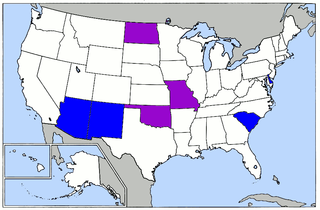
Mini-Tuesday was the name given to the February 3, 2004 U.S. presidential primary where several states, which to that point had participated in "Super Tuesday," cast their votes for the Presidential nominees of the 2004 Presidential election. Mini-Tuesday was also called Super Tuesday I. With the large number of states moving their election dates up to Mini-Tuesday for the 2008 election cycle, pundits have largely shied away from using the term again, instead choosing to reappropriate the term "Super Tuesday" to better represent the primaries held on that approximate date. The date is also known as "Super Duper Tuesday," "Giga Tuesday," and "Tsunami Tuesday," among others, with the term "Mini Tuesday" falling to apparent disuse for the time being.
The following is a timeline of major events leading up to and immediately following the United States presidential election of 2008. The election was the 56th quadrennial United States presidential election. It was held on November 4, 2008, but its significant events and background date back to about 2002. The Democratic Party nominee, Senator Barack Obama of Illinois, defeated the Republican Party's nominee, Senator John McCain of Arizona.
Statewide public opinion polls conducted relating to the 2008 Republican Party presidential primaries, typically using standard statistical methodology, include:

Super Tuesday 2008, Super Duper Tuesday, Mega Tuesday, Giga Tuesday, Tsunami Tuesday, and The Tuesday of Destiny are names for February 5, 2008, the day on which the largest simultaneous number of state U.S. presidential primary elections in the history of U.S. primaries were held. Twenty-four states and American Samoa held either caucuses or primary elections for one or both parties on this date. Furthermore, the week-long Democrats Abroad Global Primary began on this day.
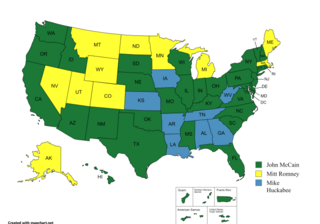
This article contains the results of the 2008 Republican presidential primaries and caucuses.
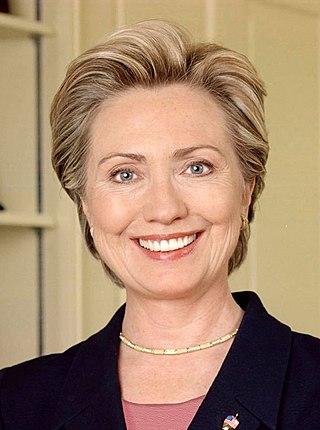
The 2008 North Dakota Democratic presidential caucuses took place on February 5, 2008, one of the many Super Tuesday nominating contests held that day. Barack Obama won the caucuses, securing 8 out of 13 national delegates.
The following is a timeline of major events leading up to the United States presidential election of 2012. The election was the 57th quadrennial United States presidential election and was held on November 6, 2012.

This article contains the results of the 2012 Republican presidential primaries and caucuses, which resulted in the nomination of Mitt Romney as the Republican nominee for President of the United States. The 2012 Republican primaries were the selection processes by which the Republican Party selected delegates to attend the 2012 Republican National Convention from August 27–30. The series of primaries, caucuses, and state conventions culminated in the national convention, where the delegates cast their votes to formally select a candidate. A simple majority (1,144) of the total delegate votes (2,286) was required to become the party's nominee.

The 2012 North Dakota Republican presidential caucuses were held on March 6, 2012. North Dakota has 28 delegates to the Republican National Convention; despite Rick Santorum's nominal win in the preference poll conducted during the caucuses, the majority of the delegates elected by the state party convention later in March said they supported Romney.
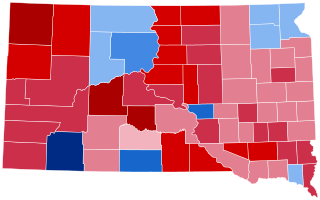
The 2012 United States presidential election in South Dakota took place on November 6, 2012, as part of the 2012 United States presidential election in which all 50 states plus the District of Columbia participated. South Dakota voters chose three electors to represent them in the Electoral College via a popular vote pitting incumbent Democratic President Barack Obama and his running mate, Vice President Joe Biden, against Republican challenger and former Massachusetts Governor Mitt Romney and his running mate, Congressman Paul Ryan.

The 2012 United States presidential election in North Dakota took place on November 6, 2012, as part of the 2012 United States presidential election in which all 50 states plus the District of Columbia participated. North Dakota voters chose three electors to represent them in the Electoral College via a popular vote pitting incumbent Democratic President Barack Obama and his running mate, Vice President Joe Biden, against Republican challenger and former Massachusetts Governor Mitt Romney and his running mate, Congressman Paul Ryan.
The following is a timeline of major events leading up to, during, and after the 2016 United States presidential election. The election was the 58th quadrennial United States presidential election, held on November 8, 2016. The presidential primaries and caucuses were held between February 1 and June 14, 2016, staggered among the 50 states, Washington, D.C., and U.S. territories. The U.S. Congress certified the electoral result on January 6, 2017, and the new president and vice president were inaugurated on January 20, 2017.
This article includes the entire 2016 Democratic Party presidential primary schedule in a format that includes result tabulation. Below are the vote totals for everyone that appeared on the ballot during the 2016 Democratic presidential primaries. Two candidates, Bernie Sanders and Hillary Clinton, appeared on all 57 ballots. Two others, Martin O'Malley and Rocky De La Fuente, appeared in over 30 states and six others appeared on between two and ten states. Nearly 20 appeared on only New Hampshire's ballot. As of June 8, Hillary Clinton was considered the presumptive nominee according to media organizations. On July 26, the second day of the Democratic National Convention, Clinton was confirmed the Democratic nominee for the 2016 United States presidential election.
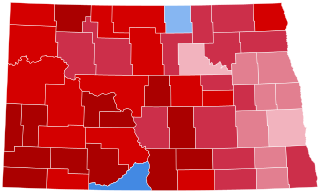
The 2016 United States presidential election in North Dakota was held on Tuesday, November 8, 2016, as part of the 2016 United States presidential election in which all 50 states plus the District of Columbia participated. North Dakota voters chose electors to represent them in the Electoral College via a popular vote, pitting the Republican Party's nominee, businessman Donald Trump, and running mate Indiana Governor Mike Pence against Democratic Party nominee, former Secretary of State Hillary Clinton, and her running mate Virginia Senator Tim Kaine. North Dakota has three electoral votes in the Electoral College.

Presidential primaries and caucuses of the Republican Party took place in many U.S. states, the District of Columbia, and five U.S. territories from February 3 to August 11, 2020, to elect most of the 2,550 delegates to send to the Republican National Convention. Delegates to the national convention in other states were elected by the respective state party organizations. The delegates to the national convention voted on the first ballot to select Donald Trump as the Republican Party's nominee for president of the United States in the 2020 election, and selected Mike Pence as the vice-presidential nominee.

Kelly Michael Armstrong is an American lawyer and politician serving as the U.S. representative for North Dakota's at-large congressional district since 2019. A member of the Republican Party, he served as the North Dakota state senator from the 36th district from 2012 to 2018 and chair of the North Dakota Republican Party from 2015 until 2018. On January 23, 2024, he announced he would not seek re-election in 2024, instead opting to run in the 2024 North Dakota gubernatorial election.

The 2020 United States presidential election in North Dakota was held on Tuesday, November 3, 2020, as part of the 2020 United States presidential election in which all 50 states plus the District of Columbia participated. North Dakota voters chose electors to represent them in the Electoral College via a popular vote, pitting the Republican Party's nominee, incumbent President Donald Trump from Florida, and running mate Vice President Mike Pence from Indiana against Democratic Party nominee, former Vice President Joe Biden from Delaware, and his running mate Senator Kamala Harris of California. North Dakota has three electoral votes in the Electoral College.

The 2020 North Dakota Democratic presidential caucuses took place on March 10, 2020, as one of several states voting the week after Super Tuesday in the Democratic Party primaries and caucuses for the 2020 presidential election. While the contest has in effect been a party-run open primary for the first time in North Dakota's history, the state party retained the traditional caucus name, classifying it as a firehouse caucus. The state awarded 18 delegates to the 2020 Democratic National Convention, of which 14 were pledged delegates allocated on the basis of the results of the election.

Presidential primaries and caucuses are being held to select delegates to the 2024 Republican National Convention to determine the party's nominee for president in the 2024 United States presidential election. The Republican primaries and caucuses have taken place or will take place in all 50 U.S. states, the District of Columbia, and five U.S. territories between January and June 2024. The 2024 Republican National Convention is scheduled to be held in July at the Fiserv Forum in Milwaukee, Wisconsin.



















